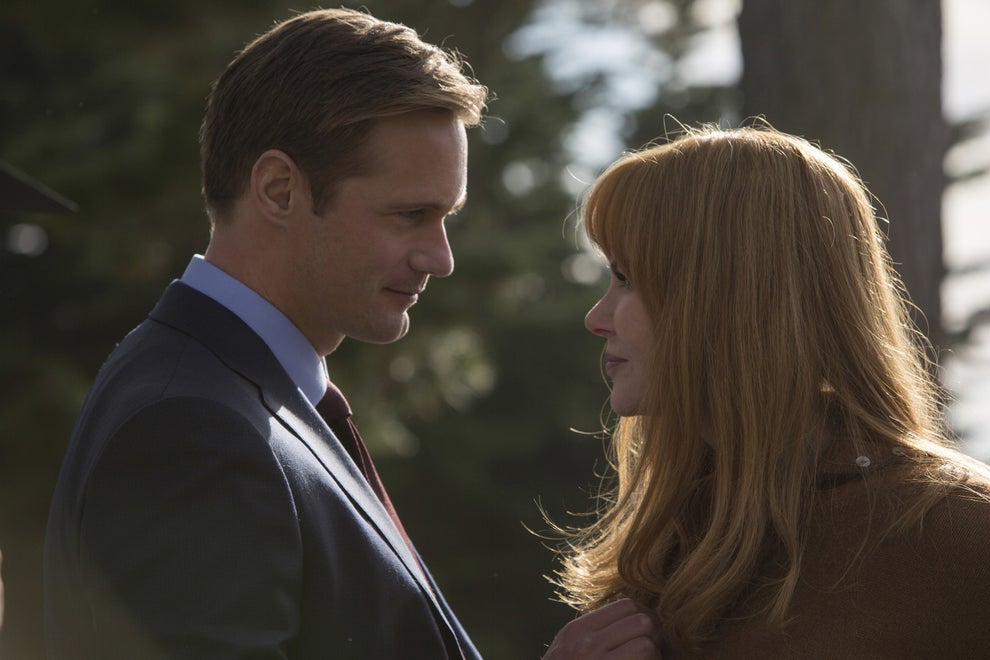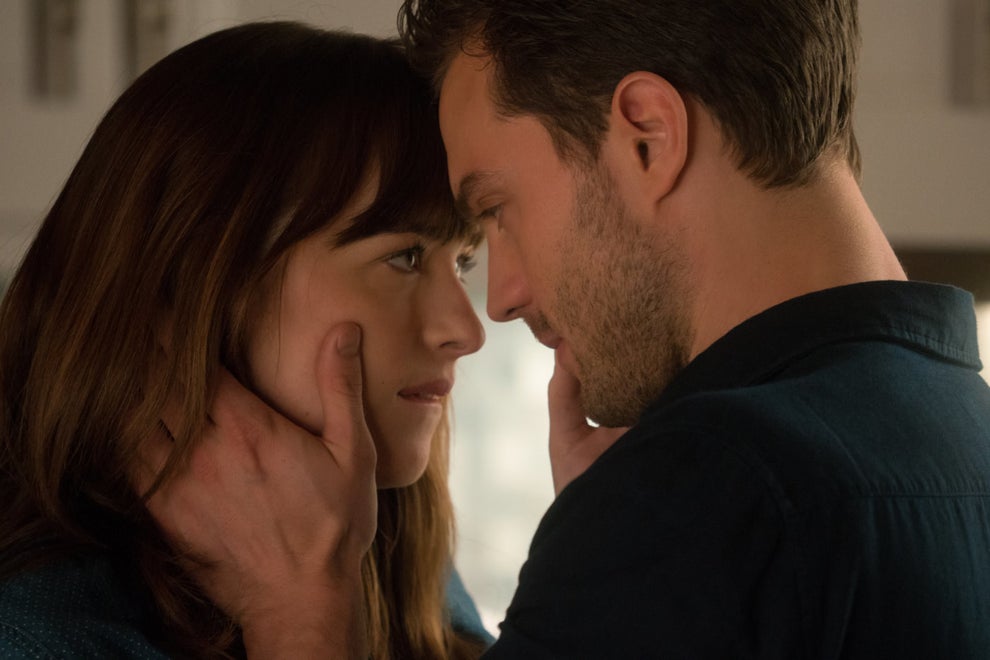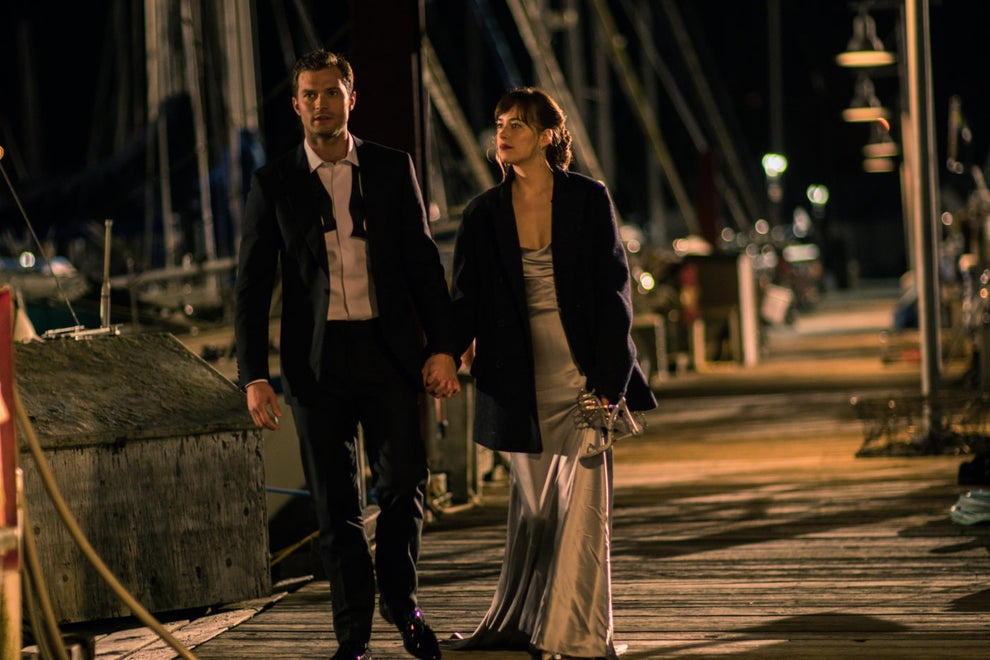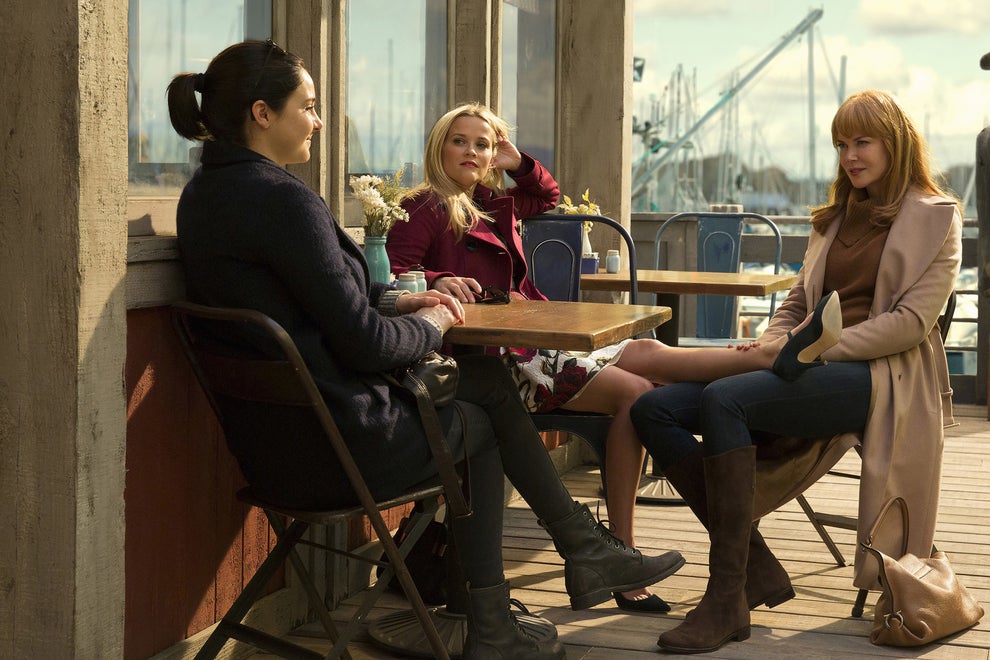
Alexander Skarsgård and Nicole Kidman in Big Little Lies Hilary Bronwyn Gayle / HBO
Does it even need to be said that Christian Grey would be a terrible boyfriend IRL?
The title object of lust of the Fifty Shades of Grey franchise would be the kind of man who’d prompt your friends to stage interventions, obviously. They’d gather, concerned, to point out that while the man you’re dating is handsome and loaded and apparently way talented at sex, he’s also controlling, emotionally aloof, and disturbingly indifferent to personal boundaries.
For instance: Near the beginning of sequel Fifty Shades Darker, Christian (played with magnificent reluctance by Jamie Dornan) learns that Anastasia Steele (Dakota Johnson, a trooper) is working as an assistant at a small press. So, he proceeds to buy the company at which she is employed in order to have some involvement in her professional life — corporate acquisition intended as a romantic gesture. “You’re going to be my boss?” the understandably weirded-out Anastasia asks, to which Christian replies, steamily, that he’s technically going to be her “boss’ boss’ boss.” (Christian Grey would also be a terrible businessman IRL, because independent regional publishing houses are hardly a reliable growth industry.)
But nothing about Fifty Shades Darker remotely resembles real life. Not the characters, not the love story, and not the shiny bizarro-world Seattle in which the franchise is set. The second installment in what will soon be a trilogy based on the notorious bestsellers by E.L. James doesn’t even bother with niceties like conflict, instead treating its short bursts of story like something to be endured between the brooding, wealth-gawking, and BDSM-inflected boot-knocking.
Dakota Johnson and Jamie Dornan in Fifty Shades Darker Doane Gregory / Universal Pictures
The film is impossible not to make fun of — it stages a heartfelt conversation in front of a prominently placed Chronicles of Riddick poster and features a scene in which Christian disarms a threat by employing his dom technique as if it were a superpower. Christian comes across as a middle schooler’s idea of what a successful businessman would be like, and Anastasia’s naiveté verges on vaudeville — she responds to an afterwork invite to “drinks at Lori’s” with “Who’s Lori?” It is terrible in a way that makes it a total gas.
As laughable as Fifty Shades Darker is, though, there’s something about the ungainly rawness of the way its particular, far-from-progressive fantasies are laid out that can’t be so easily dismissed. When you look past the softcore, safeword-skipping explorations of kink that give the movie the appearance of something boundary-pushing, its arc of a formerly untouched ingenue winning over a domineering rake could be right out of a dusty Regency romance (encapsulated perfectly in a sequence involving both Ben Wa balls and a costume ball).
Anastasia cites Jane Austen and an unspecified Brontë as shaping her expectations of romance, as if either of those poor writers deserves that blame. It’d be more accurate for her to cite the messages of fairy tales. Disney’s live action remakes of animated classics have provided ample reminders that the stories we grow up with offer happy endings in the form of being swept away by a prince (Cinderella) or transforming a frightening figure into, well, a prince (the forthcoming Beauty and the Beast, which star Emma Watson recently argued is totally not about Stockholm syndrome). Anastasia manages both.
So many of the romantic fantasies laid out in women’s fiction are rooted in gender expectations that women have fought to get away from for decades. Fifty Shades Darker isn’t just a reminder of how they persist. It is, for all of its flaws, a reminder that what women can find sexy doesn’t necessarily have any bearing on what they find empowering — and that the ability to be catered to is in itself a power. If a bunch of women want to see Jamie Dornan do a shirtless plank on a pommel horse and then take Dakota Johnson for a long yacht ride set to that Zayn Malik and Taylor Swift song, by god, their ticket-buying strength has made that happen.
In even balder ways than the first movie, Fifty Shades Darker is a romance spun out of a ravishment scenario — a dream about being so irresistible, you don’t just completely command the attention of someone powerful and desirable and intriguingly damaged, but you keep him and make him want to change for you. (When Christian vows to Anastasia that he’ll attempt a vanilla relationship for her, she buys him the corresponding ice cream flavor to commemorate the decision.) The film gets its high by taking deep hits off some of the more toxic aspects of stereotypical masculinity (jealously, extreme protectiveness, emotional remove) while attempting to leave the real world implications behind.
Jamie Dornan and Dakota Johnson in Fifty Shades Darker Doane Gregory / Universal Pictures
Which, sure, is the definition of fantasy. And observations like those of conservative blogger Matt Walsh, who tweeted, “I wonder how many of the women seeing 50 Shades this weekend also claim to be offended by Trump’s vulgarity and sexism,” highlight how laughably simplistic is it to draw a line between the film’s fantasy and anything nonfiction. (Walsh is doubly unjust — any pussy-grabbing done on screen by Christian Grey is explicitly consensual.)
Audiences are trusted to be able to handle big, dumb male-aimed fantasies at the multiplex all the time (like the delightful, in-theaters-now John Wick: Chapter 2, the mere viewing of which does not equal a tacit thumbs up to professional killing); so it’s more than fair that they should be able to handle an equally dumb but significantly rarer female-aimed fantasy, especially one so over-the-top it can’t and shouldn’t be taken seriously. But it’s inarguably an extremely complicated sort of escapism that Fifty Shades Darker is peddling, and not just because our current political situation feels like some sort of ironic punishment for our larger tendencies to idealize the wealthy, dominant man. The concepts it dabbles in — particularly the conflation of possessiveness with love — run through abusive relationships just as they do decades of fiction women have written for the enjoyment of other women.
They also run through one of the central relationships in Big Little Lies, via the troubling marriage of Celeste (Nicole Kidman) and Perry (Alexander Skarsgård), which works as a grim counterpoint to Anastasia and Christian’s breathless adventures with blindfolds and bodice ripping. The HBO limited series, adapted by David E. Kelley from the novel by Australian author Liane Moriarty, is set in upscale Monterey, California and focuses on a trio of women who are all parents. Maddy (Reese Witherspoon) and her bestie Celeste are married and live in extravagant homes along the water while Jane Chapman (Shailene Woodley), a single mother new to town, shares a one bedroom with her son. It may sound like an upscale cable version of Desperate Housewives, complete with a murder mystery, but in practice it’s as dark and bitter as a gourmet chocolate bar, burbling with a distinctively Californian passive aggressive rage beneath the scenic sunny exteriors.
Witherspoon is brilliantly brittle as Maddy, a woman so unable to acknowledge her own dissatisfaction that she instead channels her ire into feuds with her ex-husband, her oldest daughter, and a formidable fellow parent (Laura Dern). And Woodley is very good as Jane, who’s still working through some tremendous trauma. But it’s Kidman’s Celeste whose storyline resonates with a slowly, sickeningly recognizable sort of heartbreak.
Shailene Woodley, Reese Witherspoon, and Nicole Kidman in Big Little Lies Hilary Bronwyn Gayle / HBO
Celeste’s life seems the most covetable of anyone — beautiful twin boys, a beautiful house, and a beautiful husband. Perry is a banker who, in his suits, and his sunglasses, and his days-off tennis outfits, looks like he stepped off a billboard advertising some tastefully expensive designer brand. He’s a doting father, though frequently away on business trips. He and Celeste still can’t keep their hands off one another, to the point where a fellow parent complains that “people over 40 shouldn’t be gushy, it’s not cute.” In other words, he’s a prince.
Except that he lays hands on Celeste in other ways, when she does things he doesn’t like, or when he feels she’s pulling away from him, drifting from his control. Perry is abusive, always sorry, and always unable to stop. Skarsgård plays Perry with a mixture of the mundane and the menacing, never simply monstrous in a way that would make you wonder why Celeste didn’t leave sooner. Big Little Lies holds focus on Celeste as she starts to come to terms with the ways in which she has twisted herself in knots to resist acknowledging this reality for so long. In part, it’s because she hasn’t wanted her perfect-looking life to crumble, and in part, it’s because so much of Perry’s behavior is a bleak variation on the stuff sold as romantic in stories like the one in Fifty Shades Darker.
Perry is possessive, because, he explains to the therapist (Robin Weigert) Celeste insists they go see, he’s so afraid of losing his wife. He blames his insecurity on her irresistibility, that suitors would be lining up the second he’s out of the picture. He frames his insistence that she stop working on his protectiveness, on the stress she faced at work and at home when they were trying to start a family. They’re all alarming indicators that he has couched in the language of her desirability and her well-being, in turn enabling her denial, because, as we’ve been assured, isn’t this what a man madly in love would do?
Celeste’s arc through Big Little Lies’ seven episodes is of a woman coming to terms with the truth about her relationship. But it’s also about a woman coming to terms with “passion” — a term she uses both genuinely and euphemistically in sessions with their shrink — as an unacceptable excuse for abuse. Celeste and Perry’s very active sex life is upsettingly, and, for Celeste, confusingly entangled with Perry’s bursts of brutality and her answering attacks. The sex is consensual, though the violence from Perry that often initiates it isn’t. The fact that Celeste enjoys the rough intercourse has made it easier for her to pretend the problems in her marriage are mutual.
Kidman plays Celeste as a woman whose immaculate exterior has become a way for her to allow herself to go unseen. She’s coaxed into her revelation slowly, in ways that can be painful to watch, fraught with avoidance and vivid in their portrayal of how someone lies to herself. But as increasingly wrenching as the scenes of Celeste on her therapist’s couch become, the most telling one is a quieter moment for Kidman that sums up the ways in which the dynamics romanticized in escapist fare like Fifty Shades Darker can cast a shadow over relationship expectations.
It’s during one of her chats with Maddy, in which Maddy tends to dish while Celeste listens, that Celeste gingerly tries, for the first time, to broach the topic of the darkness in her marriage by describing things between her and Perry in bed as having gotten twisted. Maddy, who’s been dealing with a lack of attraction to her own husband, interprets this confession as giggly girl talk and shruggingly replies that it sounds great — another way in which her friend has it all, picturesque home life and a bit of kink at night. Celeste, who’s trying to figure out how to express to her friend the distress she’s only begun to admit to herself, isn’t describing kink or Fifty Shades-style swooniness in the least. But the broad outlines are just close enough that she doesn’t say anything more, as if worried she’ll be told she should be grateful for what she has. It is, after all, the stuff of fantasy. But it’s not a fantasy she’s living in.





